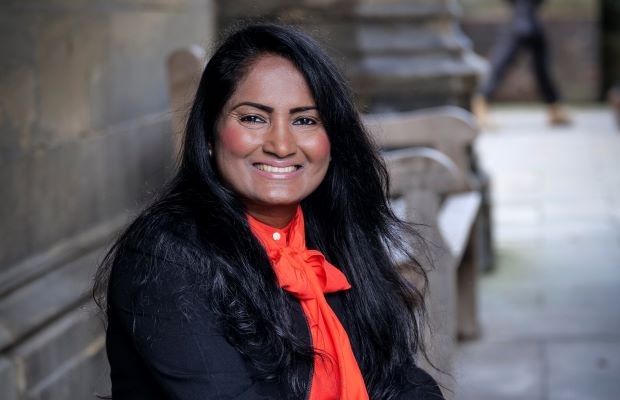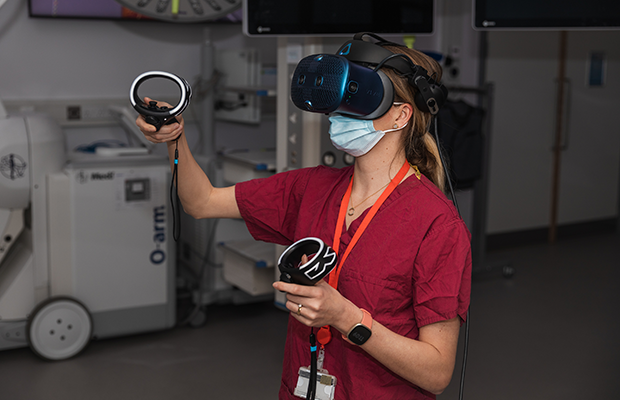Decades of research funded by British Heart Foundation (BHF) and others mean there are now excellent treatments for people who have had a heart attack. But if you’re in your 70s, 80s, 90s or even older, you are less likely to receive invasive treatment, such as stents or coronary bypass surgery.
Professor Vijay Kunadian, Consultant Interventional Cardiologist at Freeman Hospital, Newcastle upon Tyne Hospitals NHS Foundation Trust, is relentless in her drive to improve healthcare for groups of people she says are not being treated equally.
Heart attacks caused by partial artery blockages are called NSTEMI
For several years she has been leading a pioneering BHF-funded clinical trial, called SENIOR-RITA, which she hopes will revolutionise treatment for older people. She set up the trial because she spotted a glaring inequality in heart attack care.
Heart attacks are usually caused by a blockage in an artery supplying blood to the heart, but it’s not always a complete blockage. Heart attacks caused by partial artery blockages are called NSTEMI (non-ST-elevation myocardial infarction).
Several studies have shown that people aged over 75 who had an NSTEMI are less likely to be offered an invasive angiogram, a test to look for blockages in their coronary arteries.
Older people missing out on life-saving treatments
The test uses a thin tube called a catheter, which is guided through blood vessels to the heart to diagnose coronary heart disease. It is the standard care for people who have had a suspected heart attack, and helps to decide whether stents or bypass surgery to restore blood flow to the heart muscle is the best option for a patient. Without an angiogram, a patient cannot be offered these potentially life-saving treatments.
If we do not do research with older people, we cannot weigh up the benefits and risks
Professor Kunadian says that, given the poor representation of older people in research, it is not clear whether angiograms are beneficial in older adults who have had a NSTEMI.
Doctors treating patients who have had a NSTEMI have to balance the potential benefits of an invasive angiogram with the possible risks. The test can sometimes cause bleeding or damage to blood vessels, and for older people these risks are greater.
But, Professor Kunadian says: “Research on the benefits of these procedures has been done with younger people. If we do not do research with older people, we cannot weigh up the benefits and risks, and make sure people get the best possible treatment for them.”

Want to get fit and healthy?
Sign up to our fortnightly Heart Matters newsletter to receive healthy recipes, new activity ideas, and expert tips for managing your health. Joining is free and takes two minutes.
I’d like to sign-up
‘Massive’ evidence gap
Professor Kunadian has been performing invasive angiograms on her patients for many years. The idea for the trial was sparked 10 years ago when she noticed many of her patients were in their 80s or older.
Older patients deserve to be looked after the same way we would look after a 60-year-old
She explains: “I went and looked for research and I found a massive evidence gap. There was hardly any evidence on the best care for older people with NSTEMI heart attacks.
“I am driven by the patients. You can have years of life after a heart attack. Some of my patients who were in their 80s when I first saw them have come back in their 90s. One 98-year-old was telling me about all the activities she does.
“It matters so much to her great-granddaughter that she is alive and well. It’s a treatable condition and so we cannot discriminate by age any longer. Older patients deserve to be looked after the same way we would look after a 60-year-old.”

SENIOR-RITA involved 1,518 people over 75 in the UK who experienced NSTEMI heart attack across 52 hospitals. It is the biggest trial of its kind in the world. Patients taking part were randomly put into one of two groups. One group received the latest medications recommended for a NSTEMI heart attack. The second group had an angiogram, as well as medication, to decide whether they needed stents or surgery. Patients taking part were followed up for at least a year after their heart attack to compare survival rates, quality of life, and the risk of complications from invasive angiograms and treatment, between the two groups.
This trial will give us the evidence needed to know what treatment is best for older people
The participants were aged 75 to 103 and included patients who were fit and others who were in frail health. Professor Kunadian says this meant the trial involved people who are not typically included in research, providing valuable knowledge on how best to treat them.
“This will give us the evidence we need to know what treatment is best and most effective for older people, and those with other health conditions, including dementia,” she says. “They have been largely absent from research, so as doctors we do not have the information we need. But this is filling that gap in the evidence and in our knowledge.”
The results of SENIOR-RITA are to be announced at the European Society of Cardiology Congress in London in August 2024. Professor Kunadian hopes the evidence will eventually influence every doctor who treats an older heart-attack patient.
Get support with your health and wellbeing
Sign up to our fortnightly Heart Matters newsletter to receive tips on coping with difficult emotions, looking after your health and living well. Joining is free and takes two minutes.
I’d like to sign-up
Battling gender bias
Age discrimination is not the only inequality Professor Kunadian is battling. She is equally passionate about tackling gender differences in heart attack care which cost women’s lives. In 2019, she was a key supporter of a BHF-led campaign, Bias and Biology, to banish gender bias in awareness, diagnosis and treatment of heart attack.
Twice as many women each year die of coronary heart disease than breast cancer in the UK
Twice as many women each year die of coronary heart disease than breast cancer in the UK. Yet women are not always aware of the risk, meaning they can delay seeking urgent medical help. And those who do, are more likely than men to be given the wrong initial diagnosis, and less likely to be prescribed treatment to prevent a further heart attack.
Thinking big to transform care
Professor Kunadian is determined that women should receive equal heart attack care. “Heart disease is the leading cause of death in women worldwide. But we do not have enough evidence to manage and prevent heart disease in women. Not enough women are involved in clinical research, and the trials we have done in the past have generally involved more men than women. We need women-only studies.
“I want to devote the next 10 years of work to transforming cardiovascular care for women. Women have worse heart attack survival rates than men. I would like to change those statistics, so the outcomes for women are the same as men. That’s my goal, and it’s achievable.
“We need to think big. If in my lifetime we can transform the way older people and women are managed that would be amazing.”

Championing women in cardiology care
Professor Kunadian is a leading cardiologist and the first female Professor of Interventional Cardiology in the UK with her post at Newcastle University.
As a cardiologist and an academic she says she is often the only woman in a senior role. She puts her success down to her own determination and encouragement from her (mainly male) mentors.
She says: “I grew up with three brothers and as the only girl in the family you learn how to handle yourself in a male world.
If female medical students can't combine their career with a choice to have a family, we'll lose a lot of talent
“When I was appointed as a professor two years ago I was told I was the first woman. It took a little while for me to understand that.
“I see the challenges women face. My female medical students are being told cardiology is not for you because you cannot have a family. When someone eminent or prominent tells you that you are put off. And if female medical students feel they cannot combine their career in cardiology with a choice to have a family, we will lose a lot of talent.
“We need to support younger female colleagues in cardiology, and I want to be a role model for them. My message is work hard and get support from the right people and you will thrive.”
What to read next...













